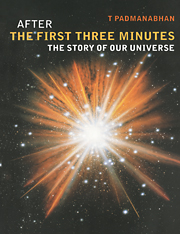5 - The expanding universe
Published online by Cambridge University Press: 02 November 2009
Summary
Expansion of the universe
The cosmic tour which we undertook in the last chapter familiarized us with the various constituents of the universe from the stars to clusters of galaxies. We saw that the largest clusters have sizes of a few megaparsec and are separated typically by a few tens of megaparsec. When viewed at still larger scales, the universe appears to be quite uniform. For example, if we divide the universe into cubical regions, with a side of 100 Mpc, then each of these cubical boxes will contain roughly the same number of galaxies, clusters, etc. distributed in a similar manner. We can say that the universe is homogeneous when viewed at scales of 100 Mpc or larger. The situation is similar to one's perception of the coastline of a country: when seen at close quarters, the coastline is quite ragged, but if we view it from an airplane, it appears to be smooth. The universe has an inhomogeneous distribution of matter at small scales, but when averaged over large scales, it appears to be quite smooth. By taking into account all the galaxies, clusters, etc. which are inside a sufficiently large cubical box, one can arrive at a mean density of matter in the universe. This density turns out to be about 10−30 gm cm−3.
The matter inside any one of our cubical boxes is affected by various forces. From our discussion in chapter 2 we know that the only two forces which can exert influence over a large range are electromagnetism and gravity. Of these two, electromagnetism can affect only electrically charged particles.
- Type
- Chapter
- Information
- After the First Three MinutesThe Story of Our Universe, pp. 96 - 125Publisher: Cambridge University PressPrint publication year: 1998



